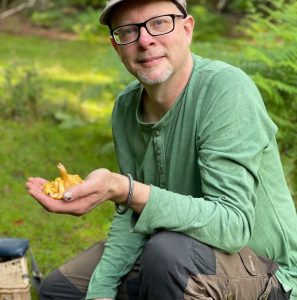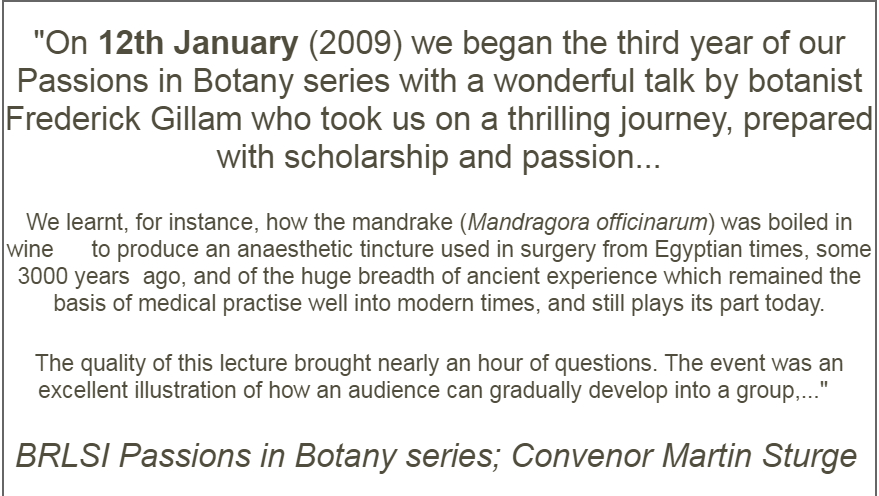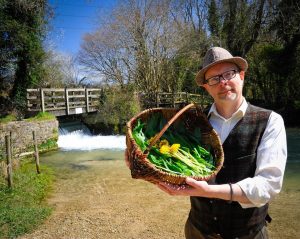
Fred Gillam is a popular public public speaker on many circuits, and has presented lectures and informal talks to auditorium audiences of up to 2,500 people, including:
Tate Britain, The National Institute of Medical Herbalists, Bath Royal Literary and Scientific Institution, The National Federation of Women’s Institutes, and garden societies, transition community groups and other interest groups.
Fred is a Fellow of the Linnean Society of London, a Member of the Bath Royal Literary and Scientific Institution and of the British Mycological Society. He is experienced at bringing topics that are both extraordinary and complex to people in easy to understand ways, and he likes to weave in his unique blend of tales and humour. The range of subjects covered, within a broadly ethnobotanical theme, includes botanical history, foraging, folklore, fungi, poisonous plants, mycotherapy and botanical (herbal) medicine.
if you would like Fred to give a talk at your conference, group meeting or public event, either in person or via Zoom, please email: Fred@thewildsideoflife.co.uk

See below for some examples of talks. Other subjects can be covered at your request, so please get in touch if you have specific idea for a talk.
The Forager’s Tales.
Coming home to find a carrier-bag nailed to the door, with a note protruding from it reading ‘HELP! – I’ve eaten these, call 01249 XXX YYY” is not an everyday occurrence; for most people. But then, neither is conducting clandestine truffle deals with chefs in the back-rooms of pubs… or personal experimentation with the ‘Incredible stinking fart trumpet mushroom’… the life of a forager is a varied one and full of surprises!
Tree Folklore, Medicine and Magic.
A look at the mysterious ancient practices, traditions and lore that surround our native trees. You will learn about the practices of the Anglo-Saxons, ‘Druids’ and early Christians who once practiced magical and religious rites and ceremonies that were intimately bound to their relationship with the trees and the land. Tales will be drawn from traditional witchcraft, faery lore and the customs of the common people as well as from the high cabal of religion.
A Potted History of Therapeutic Horticulture.
An illustrated journey from the Hanging Gardens of Babylon, through the inmates of Bethlehem Hospital and the mediaeval world view, via the depictions of Hogarth and Van Gogh and leading to the present day horticultural therapy movement and therapeutic gardens.
What’s Your Poison? – The Use of Poisonous Plants in Medicine from Ancient Egypt to Allopathy.
An illustrated discourse on the medicinal use of poisonous plants, starting with the medical papyri of ancient Egypt, and material contained in Indian Vedic texts, that documents the use of plants such as belladonna, henbane, hemlock and mandrake from classical to mediaeval times, and goes on to discuss the use of poisonous plants in Victorian medicine, and in allopathic medicine today. To paraphrase Paracelsus; “It is the dose that maketh the poison”.
What Did Ötzi know? – Raw Materials, Foods & Medicines Utilised by a Man Living In the European Copper-Age
Ötzi is the name given to the natural mummy of a man who lived some time between 3350 and 3105 BC. He is thought to have lived in the region north of Bolzano, Italy, and his his body was discovered in the Ötztal Alps, on the border between Austria and Italy. Ötzi appears to have been murdered, due to the discovery of an arrowhead embedded in his left shoulder. He was suffering from a variety of familiar modern human pathologies, including Lyme disease and osteoarthritis, and with his last meal still on board as well as a plethora of interesting items about his person (including medicinal fungi), the discovery of his body has gifted us with many insights and led to much speculation.
Magical Mushrooms – The Good, the Tasty, the Bad and the Ugly.
A talk and slide show with anecdotes from collecting fungi over the past 3 decades, recounting some of the funniest and most peculiar experiences, as well as some of the latest medical research on the benefits of eating mushrooms for health and mental, emotional and physical wellbeing. If this talk is conducted in the autumn then there will be fresh samples of some of the more interesting species for people to handle and smell… and in a small group setting, some unusual mushroom liqueurs for people to taste.
Plants of the Crossroads – A Look at Macabre Plant Folklore Through The Ages.
A talk with an ‘old curiosity shop’ feel – Plants of the Crossroads investigates the macabre side of the lore of poisonous plants, drawing from tales of witchcraft and magic, and it is lavishly illustrated with material from mediaeval texts… a talk with a gothic edge that is perhaps ideally suited to Hallowe’en!
Stinging Nettle, Dandelion and Elder Tree – Why We Should Learn To Love Our Most Despised Plants, Fast!
Why do gardeners hate these plants! This trio are often regarded as garden nasties but they are some of the most useful plants known to humanity and have supported our development in so many ways – in terms of food, medicine, and the raw materials for making essential day to day items. Find out more about these plants and what to do with them so that you too can share the love… this knowledge may come in useful one day!


